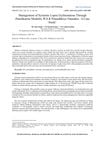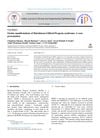 11 citations,
July 2017 in “Expert Opinion on Investigational Drugs”
11 citations,
July 2017 in “Expert Opinion on Investigational Drugs” New hair loss treatments may include topical medications, injections, and improved transplant methods.
 9 citations,
November 2018 in “Drug Discovery Today”
9 citations,
November 2018 in “Drug Discovery Today” Using skin stem cells and certain molecules might lead to scar-free skin healing.
 8 citations,
October 2019 in “Immunological investigations”
8 citations,
October 2019 in “Immunological investigations” The AIRE gene variant rs2075876 is linked to a higher risk of alopecia areata in males.
 7 citations,
December 2020 in “Clinics in Dermatology”
7 citations,
December 2020 in “Clinics in Dermatology” Some alopecia treatments might help treat COVID-19, but more research is needed.
 7 citations,
May 2010 in “Journal of Cutaneous Pathology”
7 citations,
May 2010 in “Journal of Cutaneous Pathology” A new genetic area linked to a rare hair loss condition was found on chromosome 13 in a Chinese family.
 5 citations,
December 1942 in “Journal of the American Medical Association”
5 citations,
December 1942 in “Journal of the American Medical Association” Choline and biotin are important for liver health and preventing certain deficiencies in animals, and more research is needed to understand their benefits in humans.
 4 citations,
August 2019 in “Journal of Dermatology”
4 citations,
August 2019 in “Journal of Dermatology” The conclusion is that balancing cost and carbon emissions in hybrid power systems is crucial, especially when high reliability is needed, but the model needs to consider all device efficiencies and distribution losses.
 3 citations,
June 2004 in “Alternative and Complementary Therapies”
3 citations,
June 2004 in “Alternative and Complementary Therapies” The document concludes that hair loss is influenced by genetics and other factors, and while treatments like finasteride can help, they have limitations and side effects.
 3 citations,
August 2023 in “Drug safety”
3 citations,
August 2023 in “Drug safety” Proactive monitoring and management are essential to maximize the benefits of Trastuzumab Deruxtecan while minimizing serious side effects.
 3 citations,
October 2015 in “Human Psychopharmacology-clinical and Experimental”
3 citations,
October 2015 in “Human Psychopharmacology-clinical and Experimental” Finasteride doesn't affect sleep spindles in men.
 2 citations,
October 2022 in “International journal of Ayurvedic medicine”
2 citations,
October 2022 in “International journal of Ayurvedic medicine” Licorice has many traditional health benefits, but more research is needed to fully support these claims.
 1 citations,
February 2024 in “npj digital medicine”
1 citations,
February 2024 in “npj digital medicine” Researchers improved a skin disease diagnosis model using online images, achieving up to 49.64% accuracy.
 1 citations,
November 2023 in “Naunyn-Schmiedeberg's archives of pharmacology”
1 citations,
November 2023 in “Naunyn-Schmiedeberg's archives of pharmacology” Henna has potential health benefits and can treat various conditions, but more research is needed to confirm safety and effectiveness.
 1 citations,
October 2023
1 citations,
October 2023 Syntax-based neural networks can match Transformers in handling unseen sentences.
 1 citations,
April 2020 in “Magnetic Resonance in Medical Sciences”
1 citations,
April 2020 in “Magnetic Resonance in Medical Sciences” MRI helps evaluate androgenetic alopecia severity.
 1 citations,
May 2018 in “The journal of investigative dermatology/Journal of investigative dermatology”
1 citations,
May 2018 in “The journal of investigative dermatology/Journal of investigative dermatology” The symposium highlighted the importance of understanding disease mechanisms for targeted dermatology treatments.
 1 citations,
April 2018 in “Lasers in Surgery and Medicine”
1 citations,
April 2018 in “Lasers in Surgery and Medicine” New treatments and technologies in laser medicine show promise for improving skin conditions, fat reduction, cancer treatment, wound healing, and hair restoration.
 June 2024 in “Dermatology and therapy”
June 2024 in “Dermatology and therapy” Intramuscular injections improved hair density more than intradermal injections for treating hair loss.
 April 2024 in “ScienceRise. Pharmaceutical science”
April 2024 in “ScienceRise. Pharmaceutical science” Men with hair loss feel it affects their emotions and life quality, and want more effective treatments.
 May 2023 in “Journal of complementary medicine & alternative healthcare”
May 2023 in “Journal of complementary medicine & alternative healthcare” Ayurveda's descriptions of genetic disorders align with modern genetic understanding.

Additive markers are most common and crucial for text coherence.
 November 2008 in “Medical Hypotheses”
November 2008 in “Medical Hypotheses” The conclusion suggests a new treatment for infantile hemangiomas and a potential target for hair loss treatment.
 May 2024 in “Portuguese journal of dermatology and venereology”
May 2024 in “Portuguese journal of dermatology and venereology” Reassurance and counseling are key in managing acute telogen effluvium, with supplements possibly offering a placebo effect.
 December 2023 in “Revista Urología Colombiana / Colombian Urology Journal”
December 2023 in “Revista Urología Colombiana / Colombian Urology Journal” More research is needed to find effective treatments for sickle cell disease-related priapism.

The study aims to create a model to improve personalized and preventive health care.

Pre-trained Transformers need extreme retraining to perform well on DarkNet data.

There is no cure for myotonic dystrophy type 1, so treatment focuses on managing symptoms and complications.
 January 2023 in “International Journal of Research in Medical Sciences & Technology”
January 2023 in “International Journal of Research in Medical Sciences & Technology” Panchkarma treatment can help manage symptoms of Systemic Lupus Erythematous.
 June 2022 in “Indian journal of clinical and experimental opthalmology”
June 2022 in “Indian journal of clinical and experimental opthalmology” The report shows a young man with Hutchinson-Gilford Progeria Syndrome had typical and additional eye problems related to the disease.
 January 2021 in “bioRxiv (Cold Spring Harbor Laboratory)”
January 2021 in “bioRxiv (Cold Spring Harbor Laboratory)” Mothers have more hair proteins than their children, with age-related differences in protein patterns, and some proteins in hair could indicate early childhood development.






























